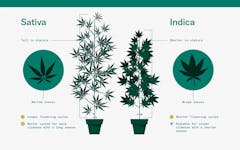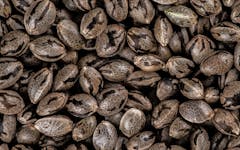Sabinene is a terpene with a peppery and citrus aroma produced by cannabis plants and numerous other flora, including Norway spruce, Holm oak trees, black pepper, cardamom, and carrot seeds. Sabinene only appears in small amounts in some cannabis strains and has shown promise for anti-inflammatory and antimicrobial benefits.
A salad is a marijuana culture term for a pipe, bubbler, or bong bowl that contains a mix of different strains ground up and mixed together. Regional variations of ‘salad’ include gumbo, blendo, mendo blendo, house party, cornucopia, goulash, and estate blend.

Sativa is one of two legacy taxonomic terms for cannabis, along with indica. Physically, sativas are usually tall, airy, narrow-leafed, and slow-growing. Typically, sativas evolved in hot, humid climates, with their lankiness and open bud structure allowing for more airflow to prevent mold. “Budtender, show me your finest sativas.
An extract usually with a high terpene content that has a liquid consistency, hence its name. Sauces are made with chemical solvents and are known for being flavorful. “This Strawnana sauce is so terpy!” “I prefer sauce over crumble because it’s more refined and more potent.
Low-quality cannabis that usually contains buds with stems, seeds, and leaves. Schwag is distinct from trim, which is sugar leaves and other plant material trimmed off of buds. “I only smoke top-shelf buds and save the schwag for making hash or edibles.
A form of extreme defoliation, in which the entire canopy of fan leaves is removed from a set of cannabis plants.
Pipes made of scientific glass are thicker, more durable, and more resistant to heat stress than standard glass. They are made with precision, of a high quality, and can stand repeated use, as if able to be used for scientific experiments.

A screen or netting placed over growing marijuana plants during the flowering stage to help increase yields. Short for “screen of green,” a scrog separates and stretches out branches of plants, increasing light exposure for more and bigger buds, as well as increasing airflow to reduce mold and pests, and providing structural support for branches.

Cannabis plants can grow from seeds and pass down genetics to their offspring through seeds. Cannabis is also dioecious, meaning it has both male and female plants.
A computer program that documents and tracks cannabis from a plant form to a product on a dispensary shelf. Every legal cannabis state is required by law to have seed-to-sale tracking software, but states with only medical marijuana may or may not be required to have it.
Short for “smoke session,” this is when a group of people gather to smoke weed. A session, or “sesh,” has an etiquette and can include any number of people and any type of product, including joints, blunts, pipes, bongs, dabs, and more. “The weed session was great until it turned into a drum circle.

Small pieces of cannabis flower that were once part of larger buds. Shake usually falls off buds when handling them or when they get jostled around in packaging. It can be used by producers to make pre-rolled joints.

Shatter is a cannabis extract that is solid and translucent in appearance, as if you could shatter it like glass. It achieves its glass-like appearance through specific processing techniques involving solvents like butane or other hydrocarbons.
A style of a percolator that resembles a showerhead, with holes or slits on the bottom of a flared vertical tube. Percolators diffuse smoke, making it smoother and easier to inhale. Smoke travels from a bowl or nail through the showerhead percolator and into the main chamber before going into the mouthpiece to be inhaled.

A Spanish term meaning “seedless,” sinsemilla refers to cannabis grown without seeds. In the wild, cannabis grows seeds along with buds so when it dies, it will grow again the following year.
Slang for a large piece of concentrate when dabbing. “My homie who dabs every day breaks off slabs when he dabs.
Using a magnifying glass to focus the energy of the sun to light a bowl of weed. Solar hits are a cleaner, more eco-friendly way of consuming weed as they don’t use lighters or butane but the natural energy of the sun.
A solvent is a substance, usually a liquid, that can dissolve other substances (called the solute), which forms a solution. In the cannabis industry, “solvent” concentrates refer to products made using chemicals such as butane, propane, ethanol, etc., which are added to a closed-loop system to extract cannabinoids and terpenes from cannabis plant material.
A concentrate made with solvents that have been purged out to non-detectable levels. Solvent-free concentrates differ from solventless concentrates, which are made without solvents. Any concentrate made with a solvent can be purged to be solvent free, though solvent-free concentrates are often oils.
The process of recycling solvents used in cannabis extraction. Through distillation, solvents can be reused for additional extraction runs, saving cannabis extractors time and money, as well as being more environmentally friendly. “This solvent recovery setup was an expensive investment but will save me a lot of money in the long run.
An insert or style of banger designed to minimize the waste of extract when dabbing. Oil can collect in the stem of classic bangers when dabbing; to prevent this loss, concentrate can be placed in an insert and the insert in a heated banger.

A joint that has tobacco mixed in with cannabis flower. “I like the flavor of a spliff.” “Don’t put too much tobacco in the spliff.
The reproductive organ of the male cannabis plant. The stamen produces pollen which carries the male plant’s genes and travels through air to pollinate a female plant. “If you see stamen early in the grow cycle, you know those are males and you have to get rid of them.
The feeling of being intoxicated from consuming cannabis, often associated with an intense relaxation and sedation. People who enter this state of mind regularly are known as “stoners.” However, the effects of consuming cannabis are varied and can also be uplifting, euphoric, energetic, and creative. “Let’s get stoned tonight before we watch The Bachelorette.

A strain refers to the named variations of cannabis that differ in appearance, aroma, and effect. Cannabis grows natively in different regions of the world and has been selectively bred for various characteristics. Terms like “sativa” and “indica” describe different structural differences in the plant: narrow vs. broad leaves, tall vs. short stature, etc.
Sugar, sometimes called “sugar wax,” is a type of cannabis concentrate with a consistency like wet sugar, or sugar mixed with a liquid, but not dissolved. Cannabis sugar is made through chemical extraction, and can be made from dried flower or fresh frozen cannabis plants. Sugar often has a bright yellow or deep amber color.
Small leaves on the cannabis plant that buds form around as the plant matures and flowers. Sugar leaves are so named because they produce trichomes, which makes them look as if covered in sugar. They can be saved as “trim” during harvest and used for pre-rolls, extracts, and other cannabis products.
Cannabis plants grown outside, under the natural light of the sun, without a greenhouse or hoop house. The term “outdoor” usually refers to plants grown outside but in a greenhouse or hoop house.
Also called a Swiss cheese percolator, it is so named because it resembles Swiss cheese—it’s a round disc covered in holes. Swiss percs are vertical discs with holes in the body of a bong or rig, and smoke is forced around the holes, cooling it.
When compounds in cannabis work together to provide greater effects and health benefits than by themselves. Synergy occurs during the entourage effect. “Because of whole-plant synergy, cannabis flower gives me more symptom relief than THC isolate.